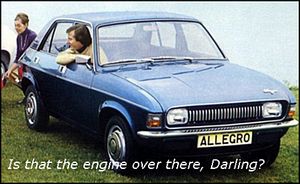|
By accessing/using The Crittenden Automotive Library/CarsAndRacingStuff.com, you signify your agreement with the Terms of Use on our Legal Information page. Our Privacy Policy is also available there. |

Does Technology Make Cars More Unreliable?
|
|---|
|
|
Does Technology Make Cars More Unreliable?
Geoff Maxted
DriveWrite
November 23, 2013
Or are they just unreliable in a different way? It wasn’t so long ago that motorists knew where they stood with a car (If it was a British Leyland motor this would probably have been in some remote layby, miles from any assistance). The purchase of certain makes and models would once have been considered daring at best and absolute madness at worst. Certainly not any of those fancy foreign jobs. Once, a patriot would only have considered buying a car made in Britain.
The Ford Motor Company made cars in this country but they were a dastardly
arriviste upstart American outfit. Italian built cars could be purchased but only if you wanted to spend a lot of time at the side of the road and the rest of the time watching your car rust and fall apart before your very eyes. No: the patriotic Briton bought cars made in Longbridge by the Austin Rover Group which over time had several different names.
What all those names had in common was a blend of awfulness and unreliability that was second to none. Where there was accidental damage the holes were filled with left-over sandwich crusts and copies of the Daily Mirror and sprayed over with a vaguely similar colour. Cars in the middle to late 20th Century were, you will have surmised, not very good.
Unless you had some money because then you could afford to buy German cars. The car manufacturers in that country realised that what the world wanted was some class and absolute reliability. The cars they made where considered to be the best you could buy. ‘Scratch a German and he bleeds precision’ was a catchphrase that had some truth in it. (Don’t take that quote literally, obviously; they don‘t like it).
But that was then. These prestigious vehicles - including all the big names - no longer quite have that reputation for bullet-proof build quality. They remain highly desirable but there have been reports of reliability issues. Despite their continuing popularity they have of late been sliding down the customer satisfaction lists. In a quick trawl through some of the latest 'top tens' of the most trustworthy cars, there isn't a German motor to be found. In fact, with the exception of Skoda, the lists mostly feature the usual Japanese suspects and including the excellent Subaru Forester we reviewed here.
The stats suggest that larger premium cars have an increasing propensity to break down and when they do they create massive repair bills - if you're out of warranty. We know that many of the cars we buy are laden with technology which, if you think about it, is just another word for things that can go wrong. Anyone who has had to fork out for parts on, say, an expensive German car will know this as the average price for a repair is often in excess of a grand. Unfortunately it is happening all too often and there has to come a point when enough is enough. The new Ford Edge Concept is a case in point. It looks great but it has the option of being able to park itself whether the person activating it is inside or outside. Why? What possible value can that add? It will all end in tears.
It seems that drivers are beginning to believe that simple is better. The Ford Fiesta - still made by those American upstarts - is now reputedly Britain’s most reliable home produced car. It is closely tracked by offerings from Vauxhall, Suzuki and of course the Far Eastern brands. It stands to reason that the more costly the car the more costly it will be to fix but for companies whose reputation is on the line it has got to be a bit of a worry when it comes to future sales. Buyers are beginning to think twice. Rules and regulations and the cost of fuel are making buyers look at cars differently. Everyone likes luxury but luxury comes at a price.



















